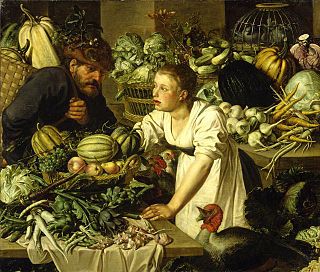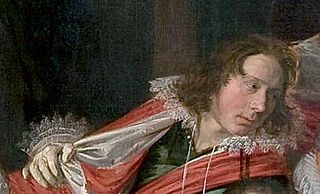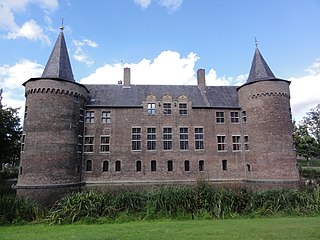
The Frans Hals Museum is a museum located in Haarlem, the Netherlands.

Cornelis Hendriksz Vroom was a Dutch Golden Age landscape painter.

Cornelis Corneliszoon van Haarlem, Dutch Golden Age painter and draughtsman, was one of the leading Northern Mannerist artists in the Netherlands, and an important forerunner of Frans Hals as a portraitist.

The Proveniershuis is a hofje and former schutterij on the Grote Houtstraat in Haarlem, Netherlands.

The Haarlem Guild of Saint Luke was first a Christian, and later a city Guild for a large number of trades falling under the patron saints Luke the Evangelist and Saint Eligius.

Cornelis Verbeeck (1590–1637), also known as Cornelis Verbeecq, was a Dutch Golden Age painter from Haarlem.

Cornelis Engelsz. (1575–1650) was a Dutch Golden Age painter and the father of Johannes Cornelisz Verspronck.

Pieter Cornelisz van Rijck, was a Dutch Golden Age painter.

Charles Cornelisz. de Hooch, was a Dutch Golden Age landscape painter and etcher.

Cornelis Symonsz van der Schalcke, or Schalcken, was a Dutch Golden Age landscape painter.

The Banquet of the Officers of the St George Militia Company in 1616 refers to the first of several large schutterstukken painted by Frans Hals for the St. George civic guard of Haarlem, and today is considered one of the main attractions of the Frans Hals Museum there.

The Haarlem schutterij refers to a collective name for the voluntary civic guard of Haarlem, from medieval times up to the Batavian Revolution in 1794, when the guilds of Haarlem were disbanded.

Jacob Cornelisz Schout, was a Dutch Golden Age member of the Haarlem schutterij.

Cornelis Jacobsz Schout, was a Dutch Golden Age member of the Haarlem schutterij.

Hendrick van Berckenrode, was a Dutch Golden Age mayor of Haarlem.

Gerrit Cornelisz. Vlasman, was a Dutch Golden Age brewer and member of the Haarlem schutterij.

Johan Damius, was a Dutch Golden Age member of the Haarlem schutterij.






















